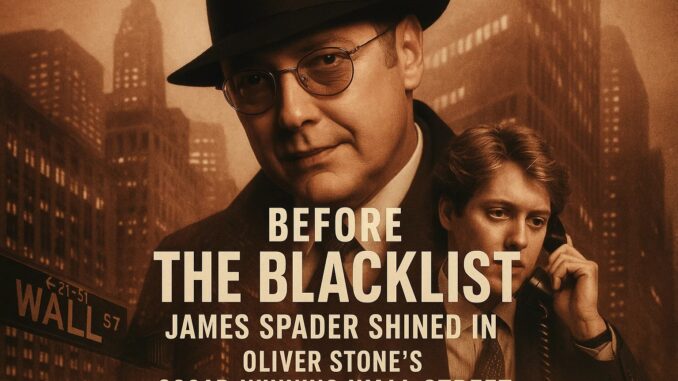
Although Oliver Stone is a director who has never been unafraid to infuse his political perspective within his films, Wall Street was among the most ambitious efforts of his entire career. Stone was able to take advantage of public consensus with films like Platoon, Born on the Fourth of July, and Salvador by entertaining the idea that American involvement in the Vietnam War was a critical error that led to unjust suffering. Comparatively, Wall Street attacked the rampant consumerism and economic success of the Ronald Reagan administration, and offered some hard truths about American capitalism. Although it is a film that features one of the best casts that Stone has ever assembled, Wall Street featured an early breakthrough performance from James Spader, long before he entered a similar world of espionage on The Blacklist.
Who Does James Spader Play in ‘Wall Street?’
Wall Street centers on Bud Fox (Charlie Sheen), an ambitious stockbroker who is given the opportunity to work alongside the legendary financial player Gordon Gecko (Michael Douglas), a man who has prided himself on the belief that “greed is good.” Although Bud is initially enthused to see how easily Gecko is able to navigate the markets, he becomes skeptical about the future of their work together when he realizes that his boss is using illegal means to dominate New York’s financial nucleus. Spader co-stars as the corporate lawyer Roger Barnes, who agrees to pass along information to Bud so that they can both profit. Barnes’ role within the justice system gives him knowledge about fluctuations in the market that prove essential in giving Bud a competitive advantage to increase Gecko’s potential earnings. After Barnes’ information is revealed by an internal investigation, Bud finds himself in legal trouble when he is accused of insider trading.

Spader’s casting was a work of brilliance, as Stone wanted to show that the ugliness of Wall Street greed took many forms. While it may have been easy for films like Trading Places to depict the upper class of New York as a group of greedy elderly men who had inherited generational wealth, Stone wanted to show that a younger generation had been enthused by Reagan’s rhetoric, and was willing to cross ethical boundaries to solidify their status in the market. Stone was able to conduct this satire by casting Spader and Sheen, two heartthrobs who had been best known for their more endearing roles within the “Brat Pack” era. Spader’s role is a fascinating one, as it shows how even an average Wall Street player could be seduced into committing crimes if granted the opportunity to improve his circumstances. While Barnes certainly did not have the critical mind that allowed Gecko to pull off his schemes, he was more than willing to sacrifice his morals when presented with the opportunity by Bud.
‘Wall Street’ Is One of the Greatest Financial Dramas
Wall Street is one of Stone’s greatest films because it paints a more complex portrait of class dynamics than other stories about unquenchable consumerism. Even if Gecko represents the epitome of what greed looks like, he is ultimately the product of a competitive system that cannot be broken into by someone who retains their ethics. Douglas won the Academy Award for Best Actor for his performance, as Gecko has been regarded as one of the most iconic villains of the 1980s. Nonetheless, Douglas’ larger-than-life work is only effective because the rest of the film feels like a very grounded drama. The authenticity with which Sheen and Spader portrayed their characters helped make the film feel more authentic.
Barnes’ character arc is essential to Wall Street, as Spader is able to turn him into a somewhat tragic character. While Barnes unquestionably engaged in criminal activity, the film suggests that his misdeeds aren’t that shocking when compared to what other Wall Street players do on a regular basis. Spader would eventually attain stardom by playing similarly complex, emotionally nuanced characters, including his role on The Blacklist. While it’s satisfying to see that he has a role in one of the best television dramas, Spader can also pride himself on having been in an iconic masterpiece that remains just as relevant today as it was in 1987.
